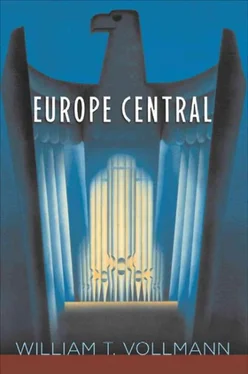The Russian title, Grenada, Grenada, Grenada Moya, sounds even more like a love song.
In our Soviet Union, of course, one may only be apolitical in the most enthusiastic and even militant fashion. It’s said that on one occasion Vlasov, having just denounced the brutal, hypocritical murderousness of a certain article in Pravda, was interrupted by the visit of a Party apparatchik. Quickly he began to praise the selfsame article. When the guest had gone away at last, Vlasov’s wife, standing numbly in the kitchen doorway, said to him, “Andrei, can you really live like that?”
Here we might as well insert another allegory. The metal of the day was steel. Hitler and Mussolini had their Pact of Steel, “Stalin” is a quite literally steely pseudonym; all hearts riflemen smiled at Vlasov, smoking their mahorka cigarettes. Then they went and died for him. The arc-welder’s glare whenever a tank was hit became their own eternal flame. Nonetheless, our attack faltered and froze. were supposed to be hardened and armored. But it remains a sad fact that in our Soviet smelting plants we most often find steel being alloyed against corrosion by means of neither that utopian substance platinum nor even the perfectly adequate nickel; rather, manganese gets pressed into this role, because it’s abundant and cheap in the USSR. So it is also with our weapons and even our fighters…
Accounts of his fate vary. The reader is invited to select one element from each of the following pairs: a bullet or a noose; the Germans or the Russians.
Here we might note that in several accounts, Vlasov is said to have fallen into German hands in the company of a certain Maria Voronova, whose husband was being reeducated at the expense of the state, in a certain unknown location in Siberia. To make ends meet, she cooked for the Vlasov family. At Vlasov’s wife’s behest, Maria Voronova supposedly made her way to the Volkhov pocket. In a photograph commemorating their capture, the pair sit in a military vehicle whose machine-guns face the sky. Vlasov’s taut, exhausted face can be seen only in near-profile. His glasses have slipped halfway down his nose. In his hand he clutches a tapering object which might well be a German cartridge, Geco 7.65 millimeter. Maria Voronova, if indeed this pallid, kerchiefed young woman is she, has managed to retain some of her attractiveness. She sits at his side, almost smiling.
The Soviet claim, that he was found on the floor of a Studebaker truck, wrapped up in a roll of carpet “like a coward,” has not yet been verified.
According to certain émigré sources, whose provenance naturally excludes them from credibility, the accused was warned that he might be tortured to death if he didn’t cooperate. —“I know that, and I’m extremely afraid,” he is alleged to have replied. “But it would be even worse to have to vilify myself…”—The even more mendacious accusation that Vlasov and his cohorts were hanged with piano wire, a hook being inserted at the base of each skull, can be refuted with the simplest extract from the Program of the Communist Party of the Soviet Union: “Communist morality is the noblest and most just morality, for it expresses the interests and ideals of the whole of working mankind.”
He kept this promise as perfectly as all the others. On 1.2.43, which is to say the day after Field-Marshal Paulus’s surrender, Generals von Weichs, von Kleist and Busch all attained to the selfsame dignity. On 1.3.44, “Hitler’s fireman,” the brave General Model, got elevated in recognition of his defensive excellence, which bought us time to gas the Hungarian Jews. The truly final Field-Marshal was Schoerner (5.4.45), a man whose commendably hysterical brutality made him long to do to the defeatists of the German General Staff what he’d already done to Russian civilians; it seems more than befitting that he received his baton from the hands of our Führer himself.
As we read in Gottfried’s Tristan : What harms love more than doubt and suspicion?… Yet it is far more remiss in a man to reduce doubt and surmise to certainty; since when he has gained his object and knows that his doubts are justified, the fact which he was at pains to track down becomes a grief surpassing all others.
Why couldn’t the human factor have been eliminated entirely? World War III, which I expect Germany to win, will be fought with robots. Then we can all hide in deep bunkers; we’ll be invulnerable. On the first afternoon of Operation Citadel, our Goliath radio-controlled explosion machines broke through at Maloarkhangelsk, but One Hundred-and-Twenty-ninth Soviet Armored Brigade defeated further penetrations. Does that fact invalidate our Goliaths? Not at all. It’s merely that we didn’t have enough of them.
Here once again let’s quote Count Hermann Keyserling’s Das Spektrum Europas, which never goes out of date: Germany is the conscience of mankind… the mirror of the world.
Comrade Ulbricht had already proven helpful to us during the Spanish Civil War, when he’d prepared Trotskyite volunteers for liquidation. He declined to smile for R. L. Karmen’s cine-camera. From her own experience, Elena Konstantinovskaya knew exactly what he was and avoided him in terror. Comrade Leonhard remembers him as follows: Being entirely innocent of theoretical ideas or personal feelings, to the best of my knowledge he never failed to carry out the directives transmitted to him by the Soviet authorities with ruthlessness and skill. This was exactly the sort of person we wanted to run East Germany. Somewhat to our surprise, he survived the death of Stalin by pointing out that if he himself were purged, the criminals of 17.6.53 might be emboldened; and, after all, nothing must accrue to the advantage of these subversive elements. In 1969, A. A. Grechko, Marshal of the Soviet Union, who’d commanded the Soviet Union’s fraternal armed forces in Germany from 1953 through 1957, was overheard to say: The old one isn’t worth much anymore. And indeed, in 1971 Ulbricht was ousted by our new man, Comrade Honecker.
As the Great Soviet Encyclopedia explains, “the Western Powers… increasingly sabotaged the work of the Allied Control Council, and in March, 1948, wrecked it completely.”
The last three notes of this, stressed, sudden and sinister, recall in equal measure the triple knuckle-taps through which Russians in public places warn one another of the appearance of a known police agent, and the three short blasts of the all-clear which in an ominous reversal of their customary meaning admonish good Germans to prepare themselves for a possible air raid.
In fact the word which predominates in “Lady Macbeth” even more than the languorously salivary tselúy, kiss me, is— boredom.
Here we must footnote the dark elegance of “Babi Yar”’s poet, Yevtushenko, who often posed for photographs with his hand on his heart, while Shostakovich smiled beside him anxiously.
“I can testify that nobody I knew fought,” writes Nadezhda Mandelstam. “All they did was lie low. That was the most that people with a conscience could do—and even that required real courage.”
Читать дальше












